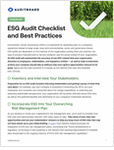 | With new SEC environmental disclosure rules on the horizon, it’s an ideal time to formulate an ESG audit plan, if you haven’t already. ESG risks involve large-scale, long-term environmental, social, and governance issues that could impact company operations if left unmitigated, such as climate change and employee welfare. Other examples include:
These risks, however, are also opportunities for growth — to become ethical, sustainable workplaces that not only simply manage risk, but proactively increase their stakeholders’ quality of life. Both internal and external auditors can play an important role in providing assurance in this area. An ESG audit is dependent on the maturity of the organization putting it into practice, the type of product manufactured or service rendered, and the social context of your organization. Nevertheless, it will likely align with other aspects of your risk management plan and compliance requirements, and can prepare you to file reports with regulatory agencies. Not sure where to start? Download this ESG Audit Checklist from AuditBoard for five best practices to consider as you identify ESG risks and establish related controls. Request Free! |
